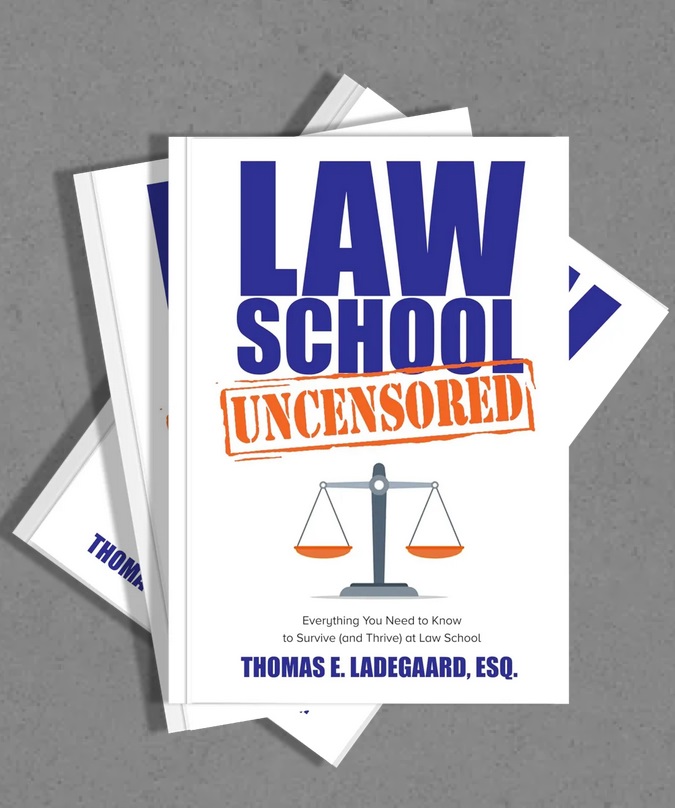
Securing a spot in law school is a daunting challenge that leaves many applicants feeling the pressure. With only 41% of applicants gaining admission, and top schools accepting a mere 12%, the path to law school isa difficult process. For aspiring lawyers, understanding the application process could mean the difference between success and rejection.
The path to becoming an attorney is a tough, obstacle-filled journey. In his book, Law School Uncensored, Attorney Thomas Ladegaard shares practical advice to help prospective law students decide if law school is right for them and how to succeed if they choose to enroll. He shares his first-hand experience, including how he was surprised by a low LSAT score and rejected by his top-choice law school, but he didn’t let those setbacks define his future in the legal field.
Ladegaard’s book offers insights into the realities of law school, particularly for applicants who might not have ideal LSAT scores or get immediate acceptance into their dream school, like with his own story. He says, “The law school journey doesn’t have to be overwhelming. I wrote this book to share practical and real-world advice from someone who’s been there. You need to not only ask the right questions to determine if law school is right for you, but then understand how to succeed when you get there. I share strategies that helped me not just survive law school, but thrive.”
By focusing on strategic planning, he shares his roadmap for success even when there are some bumps in the road and how he overcame a low LSAT score and eventually transferred to a top-tier law school graduating in the top 19% of his class. Ladegaard has personal experience on how to avoid the three biggest mistakes law school applicants make.
Mistake #1: Not Casting a Wide Enough Net. One of the most frequent mistakes prospective law students make is applying to too few schools, particularly focusing solely on one “dream” institution. This narrow approach can be a big risk. According to Ladegaard,”It’s important to apply to a range of schools to improve your chances of acceptance. Law school admissions are very competitive and having backup options ensures you don’t limit your opportunities. By casting a wider net, you can increase the likelihood of getting into law school while leaving room for future possibilities, such as transferring to a first-choice school later onlike I did.”
Mistake #2: Not Understanding Admission Requirements (Especially LSATs and GPAs). Admissions decisions often come down to two major factors: LSAT scoresand GPA. Failing to assess these requirements properly can be detrimental to the application. Many students apply to schools without researching the average LSAT scores and GPA ranges and tailoring applications to schools that align with their scores, setting themselves up for unnecessary expense and disappointment. Although an LSAT score doesn’t define a student’s future as a lawyer, it plays a key role in admissions. Ladegaard recommends, “You should apply to schools that are commensurate with your composite LSAT and GPA. If you perform well, you can transfer to a higher-tiered school later.”
Mistake #3: Believing Early College Years Don’t Matter. A common misconception is that only courses within a student’s undergraduate major or law-related courses matter when applying to law school. However, the student’s overall GPA, including freshman year, is critical in the admissions process. Prospective law students often overlook general education courses or early semesters, assuming they carry less weight. In reality, law schools consider their entire academic record. Maintaining a high GPA from the beginning of college demonstrates consistency, commitment, and the ability to handle rigorous coursework, and the early years affect their overall GPA. Law school admissions counsels create composite scores of their LSAT and GPA, and individual course grades carry less weight.
On Ladegaard’s first day of law school, his Civil Procedure professor shared with the class his belief that some people aren’t cut out to be lawyers, and it’s his job to “weed them out.” Ladegaard shares crucial strategies and a system that enabled him to succeed in his first year, and as an upperclassman. “You must adopt a consistent and structured study system and treat it like a nine-to-five job — even though you’ll probably work 12 hours a day between class attendance, reading, and briefing cases,” he suggests. “Finally, do not neglect your health and happiness since regular exercise, hobbies, and social connections can provide the balance you will need to succeed.”
Attorney Thomas Ladegaard is a practicing lawyer with 21 years of experience as a business litigator in San Diego County. Ladegaard worked in firms for his first 14 years of practice, and formed his own firm in 2017. His book, Law School Uncensored, provides valuable insights for prospective law students to set themselves up for success before they even begin their legal education with practical strategies to distinguish themselves and get in front of the curve. He says, “Success in law school starts long before you step into a classroom. By applying strategically, preparing thoroughly, and maintaining balance, you can increase your chances of not only getting into law school but thriving once you’re there.”
He serves as general counsel for various industries, leveraging his extensive litigation and transactional experience. His practice, The Law Office of Thomas E. Ladegaard, focuses on business litigation, entity formations, contract drafting, and trademark registrations, where he has become the attorney of record for over 220 trademark applications and registrations.
Media Contact
Company Name: Law Office of Thomas E. Ladegaard
Contact Person: Thomas Ladegaard
Email: Send Email
Phone: 858-699-2461
Country: United States
Website: http://ladegaardlaw.com
